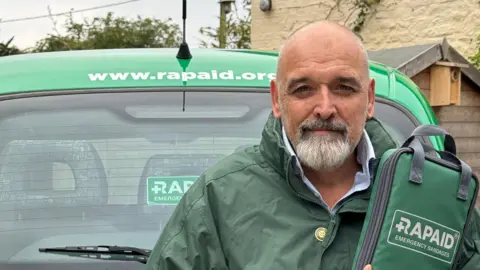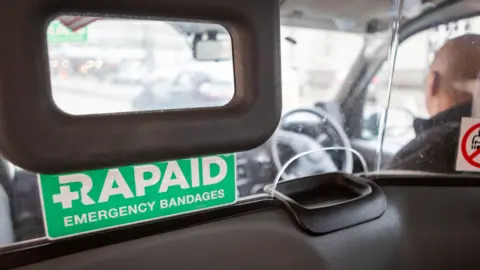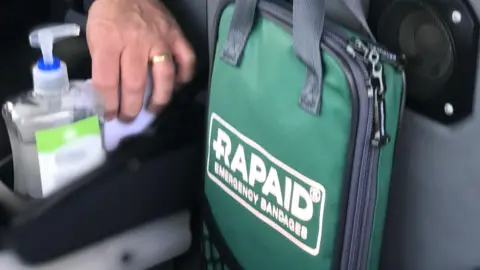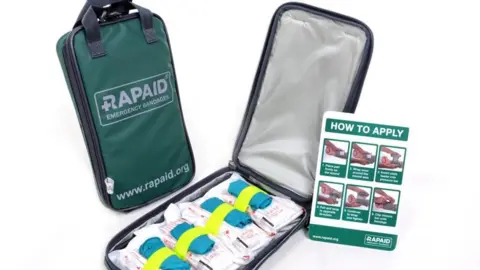Plan for taxi drivers to carry stab wound bandages
 Rapaid
Rapaid Taxis carrying military-standard bandage kits for stab wounds could soon be on the streets in parts of south Wales.
A charity run by an ex-soldier and police officer hopes to issue 50 kits to cabbies in Cardiff, as part of an expanding network that includes six other UK cities.
Kits carried by taxi drivers, identified by stickers on their vehicles, could then be flagged down by members of the public if they are assisting anyone with a stab wound.
“It’s a grim fact that you can bleed to death in under five minutes,” said Alex Chivers, co-founder of Rapaid.
“The quicker treatment begins, the better your chances of survival.”
Thousands of Rapaid kits are already in circulation around London, Manchester, Oxford, Exeter, Swindon and Plymouth, with Cardiff and Vale of Glamorgan being the next areas to benefit.
The kits include bandages designed to stem serious blood loss, with Mr Chivers saying that having them as accessible as possible to the public was a priority.
“From my experience as a police officer and the military, it’s normally the public that are the first people on scene before anybody arrives, before help comes,” he said.
“It’s those first golden minutes that people need something.
 RAPAID
RAPAID“I just thought to myself, why have the public not got access to these bandages, and how can we get them out into the public domain?
“Taxis are in and out of our communities day and night, they’re on all the high streets at night time. They’re outside all the hot spots.”
Figures show hospital admissions in Wales for assault with sharp objects has dropped recently, with 60 admissions in the year up to March 2024.
This was a 19% reduction on the previous year (74), and a 50% drop on the figures from five years ago (121).
 Rapaid
Rapaid The number of knife and sharp instrument offences recorded by police in Wales has also fallen slightly from a high of 1,680 in 2019-20, although the figures last year (1,584 offences) remained more than twice as high as they were a decade ago.
And with about half of those offences committed in the South Wales Police area, Mr Chivers admitted knife crime was still a problem within some communities.
“It’s better to have the kits and not need them, but if one bandage saves one life, then we’ve achieved what we want,” he said.
The kits are not reserved only for victims of knife crime, however, with Mr Chivers saying that kits had already been used across the country for other injuries as well, such as those involving drunk revellers or broken glass.
The aim was not to burden taxi drivers with more responsibility, he added, and they could simply “hand them over” to bystanders helping someone in need.
Stickers in the window would identify those taxis carrying the kits, with those in Cardiff also including bilingual instructions to use the bandages and help the injured person.
“What I’d love to see is that these are on the taxis across the whole country, and it just becomes normal that they carry these,” said Mr Chivers.
 Rapaid
Rapaid “People have already been saved. It’s just such a simple idea.”
The scheme, launched in Cardiff on Friday, already has the backing of the council, taxi drivers and South Wales Police.
“The authority are delighted that drivers in the city will be able to carry these kits and for the campaign to be available in the city,” said Rhys Morgan, from Cardiff and Vale of Glamorgan licencing section.
He added: “Having the tools available across the city to assist in preparedness and response to serious accidents or emergencies is a step forward in providing support to the wider daytime and nighttime economy in the city.”
